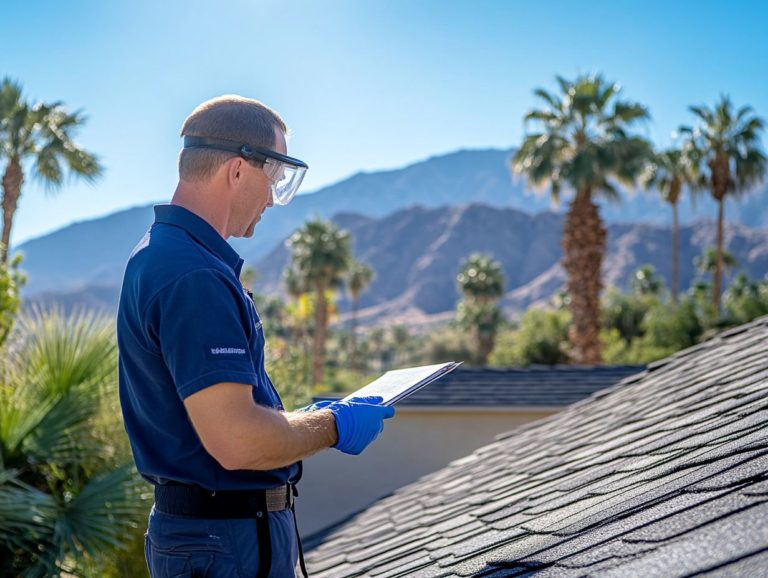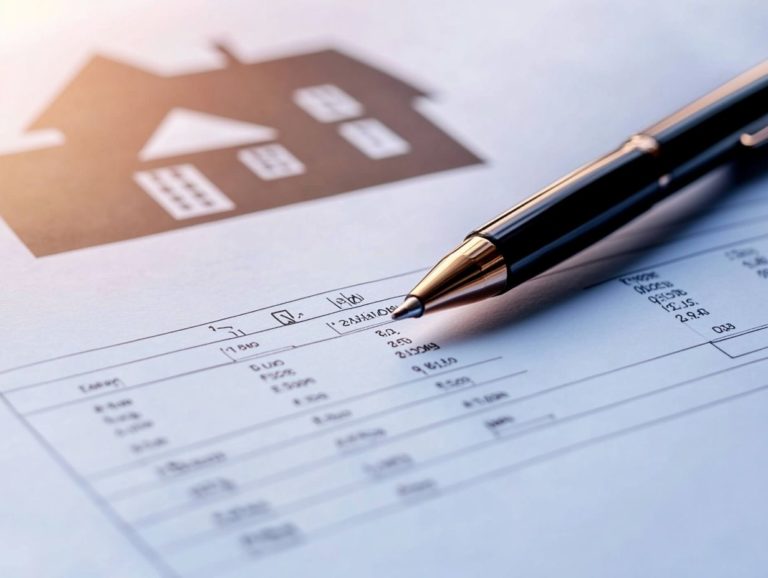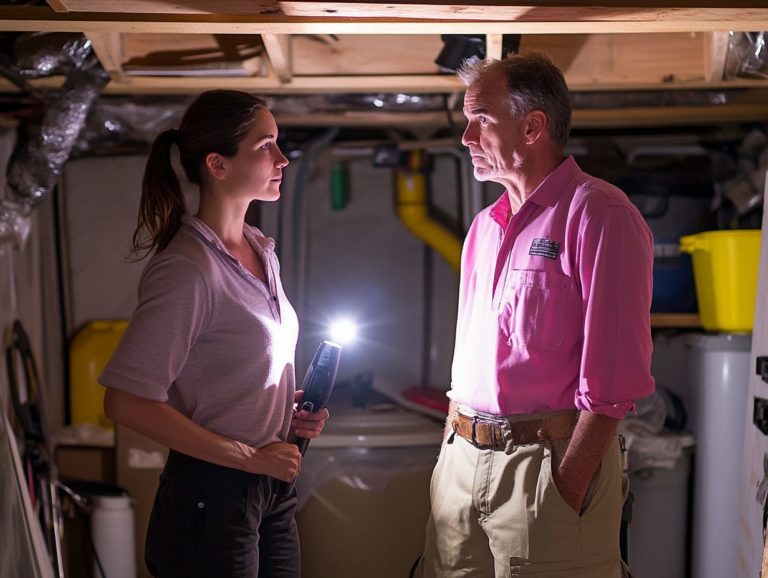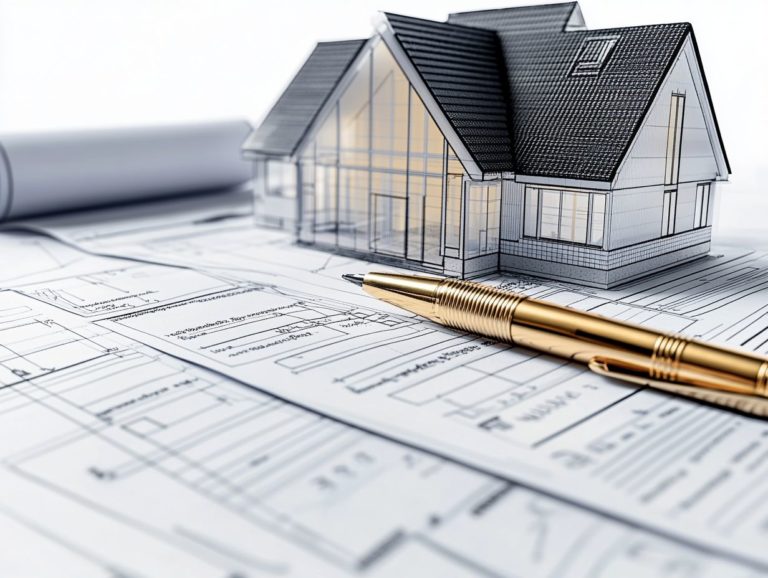The Connection Between Home Inspections and Insurance
When it comes to buying or selling a home, understanding the significance of home inspections is essential. These evaluations are key in identifying potential issues that can influence your insurance premiums and coverage options.
This exploration delves into why home inspections are necessary, how they affect your insurance, and the various types available. You’ll also find practical tips for preparing for an inspection and selecting the right home insurance to safeguard your investment.
Stay informed! Make confident choices in your homeownership journey.
Contents
- Key Takeaways:
- Why Home Inspections Matter
- Impact of Inspections on Your Insurance
- Types of Home Inspections
- Preparing for a Home Inspection
- Choosing the Right Home Insurance
- Frequently Asked Questions
- What is the connection between home inspections and insurance?
- Do all insurance companies require a home inspection?
- What types of insurance are affected by home inspections?
- What happens if a home inspection reveals issues?
- Is a home inspection the same as an insurance inspection?
- Can a home inspection help lower insurance premiums?
Key Takeaways:

- Home inspections help identify potential issues with a property.
- They can impact insurance premiums and coverage.
- Ensure your property is well-maintained before the inspection.
Why Home Inspections Matter
Home inspections are essential for protecting your property by pinpointing potential risks and damage that you might overlook. They ensure that critical systems, such as electrical, plumbing, and roofing, are functioning optimally.
This process reassures you about the safety of your home and aids in maintaining comprehensive insurance coverage. Thorough inspections can also uncover hazards that may result in expensive repairs or insurance claims, giving you peace of mind and encouraging proactive property maintenance.
Impact of Inspections on Your Insurance
Home inspections play a crucial role in shaping insurance policies, as they directly influence coverage levels, premium rates, and the probability of claims.
Insurers typically request comprehensive inspection reports that illuminate existing risks or issues, thus affecting both your premiums and the coverage options available to you.
By understanding the implications of these inspections on your insurance, you can make informed decisions and adjust your policies as needed to align with your unique situation.
Impact on Insurance Premiums
The influence of home inspections on your insurance premiums is significant since insurance companies use inspection findings to assess potential risks and determine premium rates accordingly.
When you tackle any issues that arise during these inspections, you typically benefit from lower premiums and a decreased chance of claims. This fosters a financially advantageous connection between diligent maintenance and your insurance costs.
Consider this: if you fix a roof leak or update an outdated electrical system, you re not just enhancing safety you re also improving your standing with your insurer.
Recent studies show that homes that undergo comprehensive inspections and address identified hazards can experience premium reductions of up to 20%. This proactive strategy not only cuts costs but also lessens the likelihood of claims stemming from preventable incidents.
In the end, investing in regular home maintenance and timely inspections paves the way for a safer living environment and more predictable insurance expenses.
Coverage and Claims
Home inspections are crucial for understanding the intricacies of coverage and claims within your insurance policies. By identifying existing hazards and necessary repairs during the inspection process, you can ensure that your insurance aligns seamlessly with your property s condition, minimizing the risk of disputes when it s time to file a claim.
Thorough inspections provide you with a comprehensive overview of your property, enabling insurers to offer tailored coverage options that meet your specific needs. This proactive approach clarifies the terms of your coverage and uncovers potential weaknesses in the claims process.
Common issues, such as undisclosed pre-existing conditions or misaligned coverage expectations, can be addressed directly through routine inspections. Stay ahead of these complications for a smoother claims experience if disaster strikes, paving the way for quicker resolutions and appropriate compensation.
Types of Home Inspections

There are several types of home inspections. Each one helps evaluate different aspects of your property, keeping you informed about its safety and condition.
A standard inspection usually encompasses:
- Structural integrity
- Electrical systems
- Plumbing
- Various safety features
On the other hand, specialized inspections delve deeper. They are particularly useful for older homes or addressing specific concerns like mold and pest infestations. Each type of inspection plays a vital role in effective risk management and ongoing maintenance, helping you make informed decisions about your investment.
General Home Inspections
General home inspections are thorough evaluations that check important systems and structures within your property. They provide valuable insights into potential risks and necessary repairs.
These inspections typically encompass electrical systems, plumbing, roofs, and foundations, enabling you to address concerns proactively and uphold safety standards.
The significance of these assessments transcends mere troubleshooting; they play a crucial role in ensuring compliance with essential safety features that protect both you and your property. During the inspection, qualified professionals meticulously examine various components, including heating, ventilation, and air conditioning systems (HVAC) and insulation, to confirm that they align with current regulations and standards.
By identifying issues early on, you secure a safer living environment and streamline the process of obtaining comprehensive insurance coverage. Insurance companies tend to favor properties with thorough inspections, viewing them as lower risks. This can translate into potential savings and peace of mind for you as a homeowner.
Specialized Inspections
Specialized inspections dive deep into specific issues that a general home inspection might overlook. They address unique challenges that homeowners especially those with older properties often face.
These inspections evaluate potential hazards like mold presence, pest infestations, or specific structural vulnerabilities, ensuring that every possible risk is thoroughly assessed.
By meticulously examining key elements such as foundation integrity, plumbing systems, and electrical wiring, these inspections play a vital role in identifying problems that could escalate into serious safety concerns in the future.
For example, uncovering hidden mold poses health risks for residents and can also result in hefty remediation costs. A thorough inspection can impact your insurance premiums and coverage options; properties with documented issues may face increased rates or limited coverage.
Understanding these nuances enables you to make informed decisions, enhancing your property s safety and potentially shielding you from costly surprises down the road.
Preparing for a Home Inspection
Preparing for a home inspection is crucial! It sets the stage for a smooth process and an accurate property evaluation.
This preparation involves taking care of any minor repairs, ensuring easy access to all areas of your home, and familiarizing yourself with the inspection checklist used by professionals.
Details matter! They can affect the inspection’s outcome and your insurance coverage.
Tips for a Successful Inspection
Want a successful home inspection? Make sure to create easy access for the inspectors. Clear areas around electrical systems, plumbing, and the foundation.
Addressing minor repairs ahead of time can significantly enhance your inspection report and may even improve your insurance coverage. By taking these proactive steps, you elevate the inspector’s experience and uncover hidden issues that might lead to costly repairs down the line.
Regular maintenance like cleaning gutters, checking for water leaks, and ensuring your HVAC systems are in optimal condition plays a vital role in preserving your home’s integrity.
Consider providing the inspector with essential documentation, such as past repair records and warranties. This transparency fosters trust and demonstrates your commitment to proper care, which can positively influence the outcome of the inspection.
Choosing the Right Home Insurance

Selecting the right home insurance is crucial for you as a homeowner. It directly influences both the coverage you receive and the premiums you pay.
With a myriad of options available, understanding the nuances of specific policies and identifying coverage gaps will enable you to choose an insurance plan that aligns perfectly with your needs.
Factors to Consider
When selecting home insurance, you need to consider various factors that impact your coverage and premiums. These include the type of property you own, its location, and any existing risks associated with your home.
Understanding deductibles the amount you pay out of pocket before insurance covers costs and coverage limits is crucial for making smart financial choices. A thorough assessment of your neighborhood’s crime rate and its susceptibility to natural disasters can significantly shape your insurance policy.
Evaluate the age and condition of your property. Older homes may need special coverage due to outdated systems. Don’t overlook safety features like security systems or fire alarms. These can potentially lower your premiums and affect how insurers assess overall risk.
By considering these elements, you can navigate the intricate relationship between your unique situation and the insurance options available to you, ensuring you make the best choices for your peace of mind.
Coverage Options
Coverage options in home insurance can be quite diverse, allowing you to tailor your policy according to your specific risks and needs. These options typically include dwelling coverage, personal property coverage, coverage that protects you if someone gets hurt on your property, and additional living expenses.
Dwelling coverage primarily safeguards the structure of your home. This protects you from damages caused by risks such as fire, storms, and vandalism.
Personal property coverage extends its protective umbrella over your belongings, covering everything from electronics to furniture against theft or damage.
Liability coverage is vital for shielding you against legal claims that may arise from accidents on your property, securing your financial future in potentially costly scenarios.
If your home becomes uninhabitable due to covered damages, additional living expenses coverage helps you afford temporary accommodations without breaking the bank.
Understanding these options not only helps you mitigate significant risks but also streamlines the claims process, ensuring you re prepared and sufficiently protected in unfortunate events.
Understanding Insurance Requirements
Understanding insurance requirements is essential for you as a homeowner. These requirements ensure that your property is compliant and adequately protected. They often outline necessary inspections, safety measures, and specific coverage options that effectively safeguard against various risks.
By familiarizing yourself with these guidelines, you can navigate potential risks linked to your property, such as natural disasters or theft, with greater confidence. Regularly evaluating safety features like smoke detectors and secure locks not only enhances your safety but can also have a positive effect on your insurance premiums.
Keeping up with evolving regulations significantly strengthens your ability to file claims successfully. Many insurance companies take compliance into account when processing those claims. It s crucial for you to periodically review these requirements, as shifts in local laws or insurance policies can directly impact your overall coverage and financial stability.
Watch this video to learn more about home insurance essentials.
Frequently Asked Questions
What is the connection between home inspections and insurance?
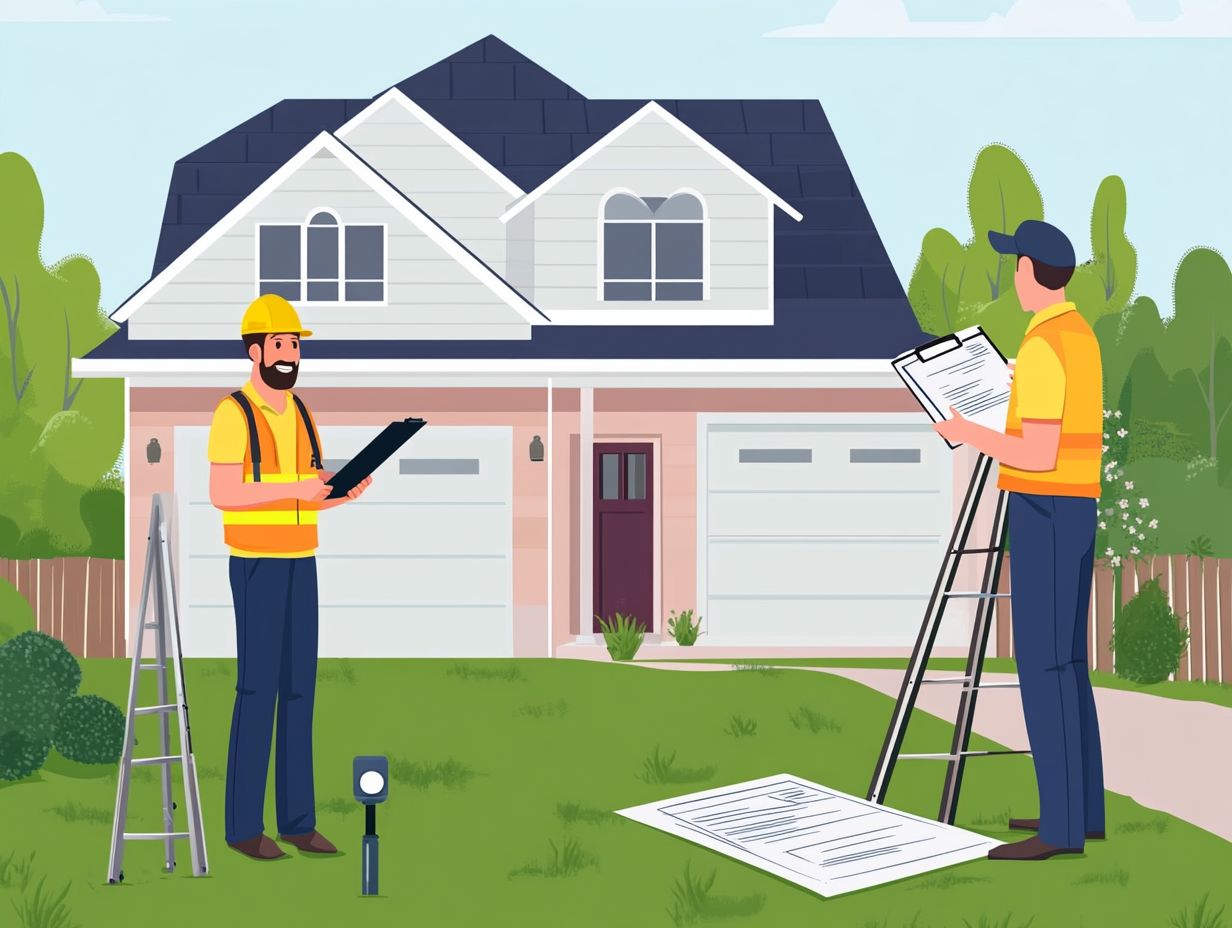
The connection between home inspections and insurance is that insurance companies often require a home inspection before providing coverage for a property. For more detailed information, check out what to know about home inspection policies, as a home inspection helps identify potential risks and hazards that could lead to costly claims in the future.
Explore your home insurance options or contact an agent for personalized advice today!
Do all insurance companies require a home inspection?
No, not all insurance companies require a home inspection. However, many will ask for one to check the property’s condition and safety before giving coverage.
Some companies may offer discounts for homes that have recently undergone a professional inspection.
What types of insurance are affected by home inspections?
Home inspections can influence various types of insurance, such as homeowners insurance, rental property insurance, and even some business insurance. Insurers want to confirm that the property is safe and well-maintained to lower their risk of claims.
What happens if a home inspection reveals issues?
If a home inspection finds problems, the insurance company might ask you to fix them before they offer coverage. It’s crucial to tackle these issues promptly.
In some cases, coverage may still be provided, but certain issues could be excluded until resolved. Reviewing the inspection report and making necessary repairs ensures you get full coverage.
Is a home inspection the same as an insurance inspection?
No, a home inspection is different from an insurance inspection. A home inspection is performed by a professional who evaluates the property’s overall condition. In contrast, an insurance inspection is conducted by the insurer to assess risks and potential hazards.
However, the findings of a home inspection can affect the insurance inspection and ultimately the costs and coverage for the property.
Yes, a home inspection can lower insurance premiums in some cases. If the inspection shows that the property is well-maintained and free of major risks, you might receive discounts or reduced premiums.
Addressing any issues found during the inspection can also help lower your premiums over time by reducing the likelihood of future claims.
Act now to secure the best insurance rates! Schedule a home inspection or consult your insurance agent for more information.


